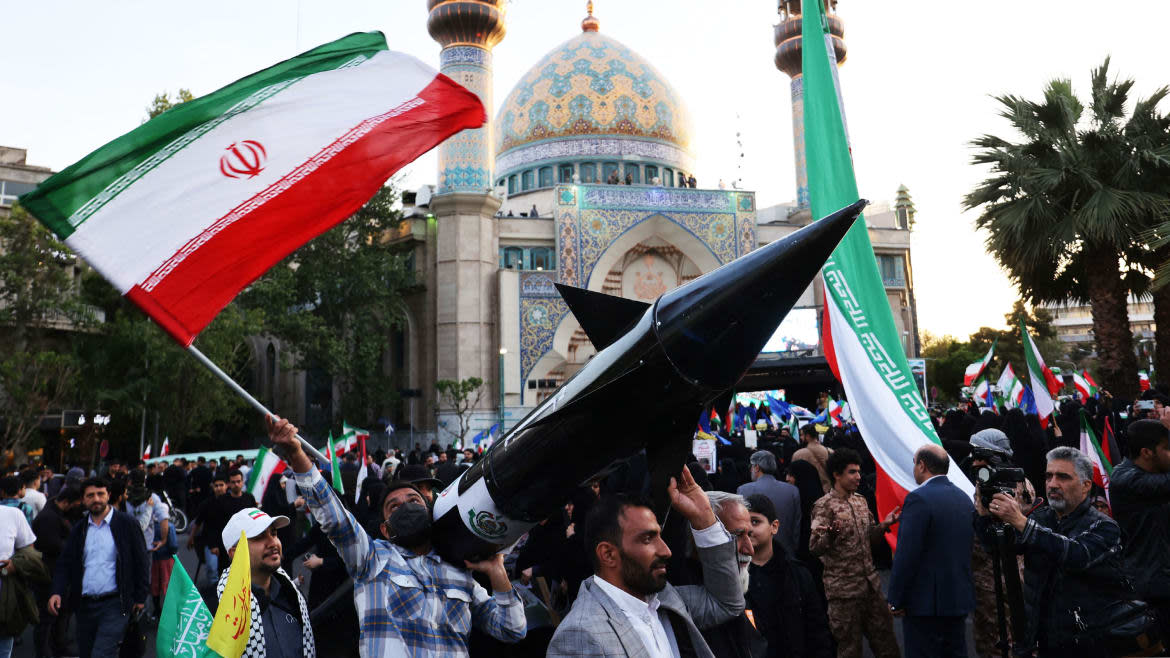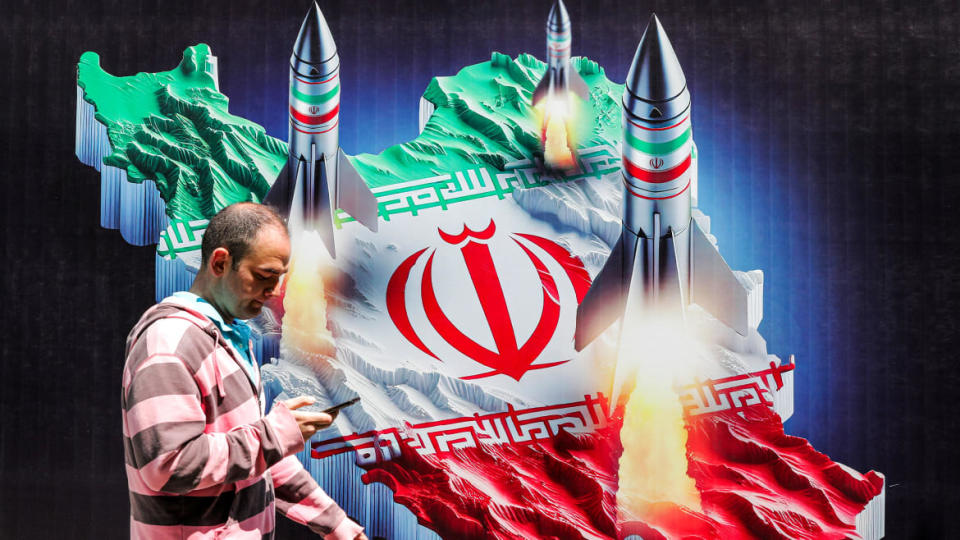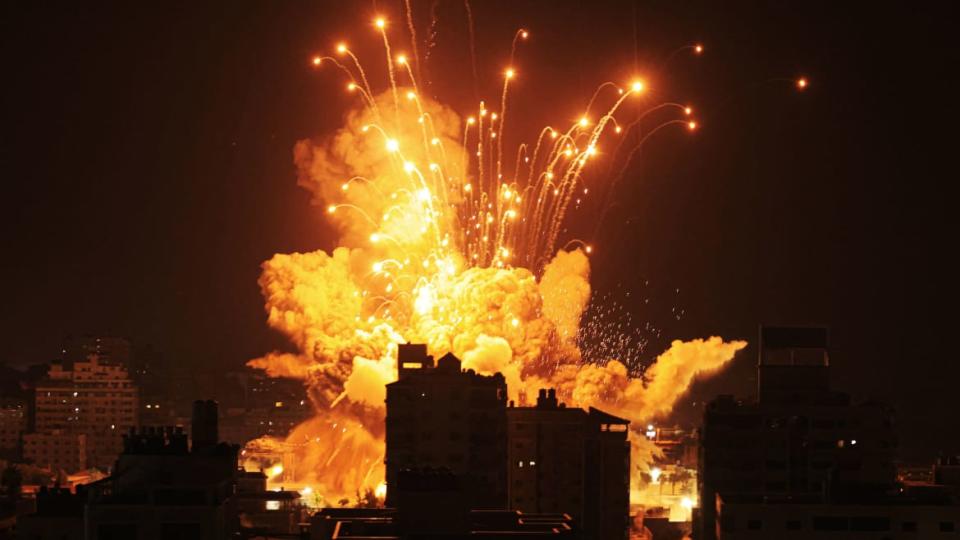Iran’s Nuclear Program Could Speed Up After Strikes With Israel

There are many creatures in the animal kingdom—from weasels to spotted skunks to ostriches—that perform a dance to intimidate their enemies.
This week, we saw generals in both Israel and Iran perform their own weasel dances. They made a great show, flexed their muscles in the most visible possible way, and did so with the apparent objective of sending a message to their adversaries.
Both sides launched aerial attacks at one another. But there is plenty of evidence to suggest, in both cases, the objective of the attack was more to ward off a war than to trigger one.
U.S. Must Pull Out All the Stops to Avoid a Regional War After Iran Attacks Israel
The risks involved with this communications strategy have been immense—either attack could have produced unintended consequences that could have triggered immediate escalation. But for now, the entire Middle East is breathing a momentary sigh of relief that that did not happen.
But the entire region is on edge and for good reason. In the past few days we came closer to a full-scale war between Iran and Israel than we have ever been before.
And while the consequences of this week’s dance suggest that—for the moment—cooler heads have prevailed, possible reactions to this brush with catastrophe may make future confrontations far more dangerous.
Indeed, there are some indications that the recent exchanges may push Iran even closer to being a fully-fledged nuclear weapons state. (A path that, we must remember, was accelerated thanks to the Donald Trump administration’s devastatingly bad decision to blow up the nuclear agreement that had existed with Iran.)

A man walks past a banner depicting missiles launching from a representation of the map of Iran colored with the Iranian flag in central Tehran on April 15, 2024.
Holly Dagres, a nonresident senior fellow with the Atlantic Council’s Middle East programs, characterized Iranian state media efforts to downplay Israel’s attack on the country as a declaration that “It’s always sunny here in Esfahan.” And many other experts have suggested the nature of the Israeli attacks and the Iranian response have signaled a desire to dial back the risk of immediate full scale war between the two nations.
By the same token, the attack on Esfahan was, in the eyes of many, designed to demonstrate that Israel had the capability to attack Iran’s nuclear facilities, some of which are located in that Iranian city. And the Iranians just days ago warned that should Israel launch an attack on Iran’s nuclear facilities they would accelerate their efforts to finalize the development of their own nuclear weapons.
Joseph Cirincione, a respected Washington, D.C. nuclear weapons expert, said that Friday’s “limited strike by Israel does not appear to have changed Iran’s posture. But more serious attacks certainly would. Some factions in the Iranian government are already pushing to expand the nuclear program and for strikes on Israel with more advanced missiles.”
He added, “Any Israeli attacks on Iran’s nuclear sites wouldn’t stop the program, they would accelerate it. Iran would conclude that Israel posed an existential threat to the government and the nation, requiring an extraordinary response.”
What if Putin Doesn’t Want Peace?
Kim Ghattas, author of Black Wave: Saudi Arabia, Iran and the Forty-Year Rivalry That Unraveled Culture, Religion and Collective Memory in the Middle East, offered a different perspective, stating, “Iran’s policy of proxies is not working for them anymore so they might feel the need to ramp up nuclear work. But Israel’s strikes show the potential consequences of that angle—they can strike deep inside Iran.”
She adds, however, that recent events—plus domestic economic and political challenges—suggest that “the Iranians are in deep trouble…which can make this a dangerous phase.”
Dagres observes, “Regardless of the events of the last week, Tehran has been rethinking its nuclear program based on Iranian officials' comments over the past year. They seem to be increasingly leaning towards going all the way for a nuclear weapon. It's hard to say if the Israeli response will impact that calculation, however.”

A missile explodes in Gaza City during an Israeli air strike on October 8, 2023.
Jon Wolfsthal, who served as senior director for arms control on the Obama White House National Security Council, had a somewhat different but still unsettling take, “I am not sure it leads them straight to nukes. Iran still benefits from being a latent nuclear state, not crossing any red line, but with everyone knowing they could if they wanted to.”
Wolfsthal continued, “I do think it leads Iran to rely more on unconventional ways to attack Israel, through terrorism, perhaps containerized explosives, and less “traditional military” concepts like missiles and drones. Also, Iran is developing maneuvering hyper glide missiles and it’s not clear Israel’s defenses will be as effective against those.”
But, Wolfsthal notes, “Some in Iran could say—well, we tried it small and failed so we need to go big.” Then, he added, “But Iran is risk averse in many ways despite their recent barrage.”
The risk aversion was demonstrated in the muted reaction to Israel’s attacks—if not in terms of the scope and ferocity of its own attack on Israel. And therein lies the problem.
Russia Mutiny Is More Proof the World Needs to Get Rid of Nuclear Weapons
While cooler heads have prevailed for the moment, both countries are home to many leaders who are not known for their restraint. Returning their sparring to the “shadow war” of the past few years seems a likely next step. But what then?
Israel is already a nuclear power. Iran is very nearly one. Israel’s nuclear and advanced military capabilities were long thought to provide a deterrent shield that would dissuade Iran from a direct attack. That deterrent is now, at least to some degree, open to question. Iran has felt that the threat of going nuclear would serve as an effective deterrent. That has not worked either.
So here we are. A moment at which both sides appear willing to pull back from the bring of confrontation, but one that also leaves tensions high and raises the prospect that the next wave of direct conflict between Israel and Iran could be far more dangerous.
Get the Daily Beast's biggest scoops and scandals delivered right to your inbox. Sign up now.
Stay informed and gain unlimited access to the Daily Beast's unmatched reporting. Subscribe now.


